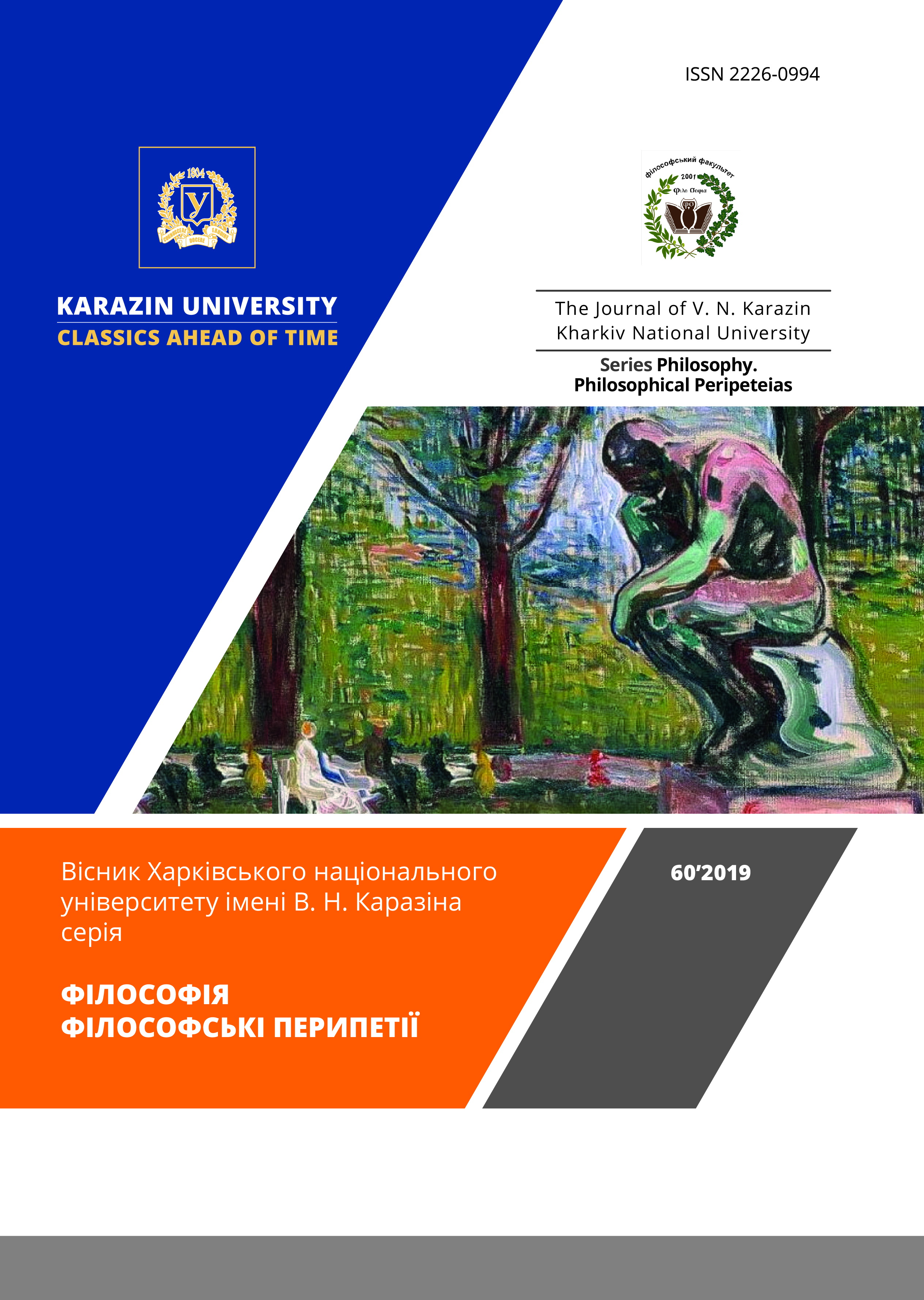MICHEL FOUCAULT’S ARCHAEOLOGY OF LANGUAGE
Abstract
Natural language plays a fundamental role in cognition and communication, but in the modern information society, language is increasingly used as a data transmission technology. The study of the problem of language power over thinking is a significant contribution to understanding the nature of language and its relationship with thinking. This article presents an analysis of the peculiarities of M. Foucault’s views on the problem of relationship between language and thinking. The author applies the elements of Foucault’s archaeological approach and studies his concepts in connection with the ideas of other French thinkers. During the analysis, the author formulates her vision of the concepts of power and discourse. The first part of the article considers the understanding of natural language as a complex open sign system that interacts with the outside world and constantly accumulates elements of culture and creativity, from the point of view of philosophy and structural linguistics. The understanding of the division of language into separate discourses is explained. The presentation of the original methodology of Foucault’s language research explains what makes it possible to reveal the peculiarities of the historical development of discourse in the social aspect. Further, Foucault’s views on the role of language in obtaining knowledge and the formation of thinking are reflected, as well as an understanding of the relations of power that the philosopher notices in mental and speech activity of individuals. There follows J. Baudrillard’s criticism of Foucouldian concept of power and the process of language development in society. In conclusion, the author summarizes the analyzed views on power, development of language and thinking as well as Foucault’s understanding of language.
Downloads
References
/References
Avtonomova, N. S. (1994). Preface. In Foucault, M. The Order of Things: Archaeology of the Human Sciences (pp. 7–32). (V. P. Vizgin, N. S. Avtonomova, Trans.). St. Petersburg: A-cad. (In Russian).
Baudrillard, J. (2007). Forget Foucault (N. Dufresne, Trans.). In Forget Foucault (pp. 27–67). Los Angeles: Semiotext(e). (Original work published 1977).
Castells, M. (2009). Communication Power. Oxford, New York: Oxford University Press.
Deleuze, G., & Guattari, F. (1980). Capitalisme et schizophrénie. Mille plateux. Paris: Les éditions de minuit.
Foucault, M. (1993). About the Beginning of the Hermeneutics of the Self: Two Lectures at Dartmouth. Political Theory, 2 (21), 198–227.
Foucault, M. (1972). Histoire de la folie à l'âge classique. Folie et déraison. Paris: Éditions Gallimard.
Foucault, M. (1976). Histoire de la sexualité. La volonté de savoir. Paris: Éditions Gallimard.
Foucault, M. (1969). L’archéologie du savoir. Paris: Éditions Gallimard.
Foucault, M. (1966). Les mots et les choses: une archéologie des sciences humaines. Paris: Éditions Gallimard.
Foucault, M. (1970). L'Ordre du discours. La leçon inaugurale au Collège de France. Retrieved from http://1libertaire.free.fr/Foucault64.html.
Foucault, M. (1975). Surveiller et punir. Naissance de la prison. Paris: Éditions Gallimard.
Heidegger, M., & Krell, D. F. (1993). Basic writings: from Being and Time (1927) to The Task of Thinking (1964). (Rev. and Expanded ed.). San Francisco, California: HarperSanFrancisco.
Saussure, F. de (1971). Cours de linguistique générale. Paris: Payot. (Original work published 1916).
Ushakin, S. A. (1996). After the modernism: language of power or power of language. Obshestvennyie nauki i sovremennost – Social studies and modernity, 5, 130–141. (In Russian).
Wittgenstein, L. (1922). Tractatus Logico-Philosophicus. (C. K. Ogden, Trans.). London: Kegan Paul, Trench, Trubner. Retrieved from: http://writing.upenn.edu/library/Wittgenstein-Tractatus.pdf. (Original work published 1921).
Автономова Н. C. Предисловие. Фуко М. Слова и вещи. Археология гуманитарных наук / пер. с фр. В. П. Визгина, Н. С. Автономовой. СПб.: А-cad, 1994. С. 7–32.
Ушакин С. А. После модернизма: язык власти или власть языка. Общественные науки и современность. 1996. № 5. С. 130–141.
Baudrillard J. Forget Foucault / Nicole Dufresne, Transl. Forget Foucault. Los Angeles: Semiotext(e), 2007. pp. 27–67.
Castells M. Communication Power. Oxford, New York: Oxford University Press, 2009. 571 p.
Deleuze G., Guattari F. Capitalisme et schizophrénie. Mille plateux. Paris: Les éditions de minuit, 1980. 645 p.
Foucault M. About the Beginning of the Hermeneutics of the Self: Two Lectures at Dartmouth. Political Theory. 1993. Vol. 21. № 2. pp. 198–227.
Foucault M. Histoire de la folie à l'âge classique. Folie et déraison. Paris: Éditions Gallimard, 1972. 583 p.
Foucault M. Histoire de la sexualité. La volonté de savoir. Paris: Éditions Gallimard, 1976. 224 p.
Foucault M. L'Archéologie du savoir. Paris: Éditions Gallimard, 1969. 288 p.
Foucault M. Les mots et les choses: une archéologie des sciences humaines. Paris: Éditions Gallimard, 1966. 405 p.
Foucault M. L'Ordre du discours. La leçon inaugurale au Collège de France [Electronic resource]. 1970. URL: http://1libertaire.free.fr/Foucault64.html.
Foucault M. Surveiller et punir. Naissance de la prison. Paris: Éditions Gallimard, 1975. 328 p.
Heidegger M., Krell D. F. Basic Writings: from Being and Time (1927) to The Task of Thinking (1964) / Rev. and expanded ed. San Francisco, California: HarperSanFrancisco, 1993. 452 p.
Saussure F. de. Cours de linguistique générale Paris: Payot, 1971. 331 p.
Wittgenstein L. Tractatus Logico-Philosophicus [Electronic resource] / C. K. Ogden Transl. London: Kegan Paul, Trench, Trubner, 1922. URL: http://writing.upenn.edu/library/Wittgenstein-Tractatus.pdf.
Authors who publish with this journal agree to the following terms:
- Authors retain copyright and grant the journal right of first publication of this work under the terms of a license Creative Commons Attribution License 4.0 International (CC BY 4.0).
- Authors are able to enter into separate, additional contractual arrangements for the non-exclusive distribution of the journal's published version of the work (e.g., post it to an institutional repository or publish it in a book), with an acknowledgement of its initial publication in this journal.
- Authors are permitted and encouraged to post their work online (e.g., in institutional repositories or on their website) prior to and during the submission process, as it can lead to productive exchanges, as well as earlier and greater citation of published work.






3.gif)




